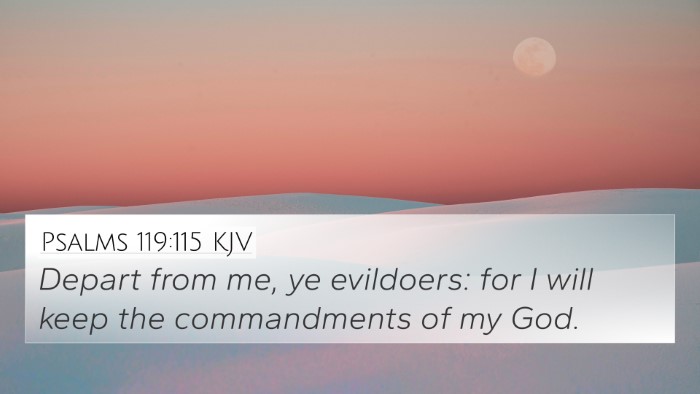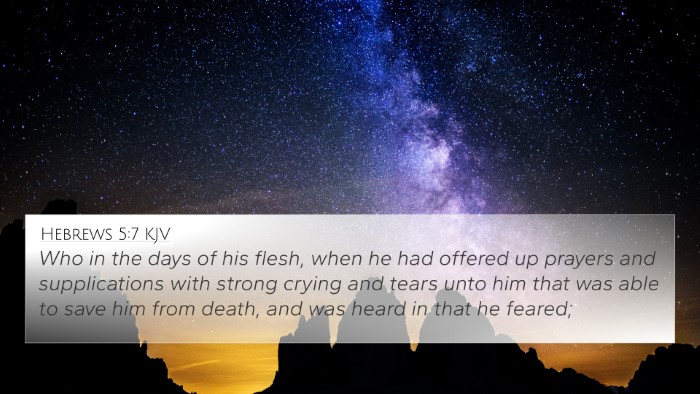Understanding Psalms 6:8
Psalms 6:8: "Depart from me, all ye workers of iniquity; for the Lord hath heard the voice of my weeping."
This verse captures a moment of deep emotional distress where the psalmist seeks to separate himself from those who engage in wickedness. The tone is one of pleading and clarity, establishing a divide between the righteous and the unrighteous.
Verse Meaning and Exegesis
The insights from various public domain commentaries paint a comprehensive picture of this verse:
- Matthew Henry: He highlights the psalmist's sorrow and desperation, suggesting that his cry signifies a plea for divine intervention. Henry notes that the phrase "Depart from me" indicates a necessary distancing from those who pursue iniquity. It serves as a firm boundary as the psalmist aligns himself with God’s assurances of help.
- Albert Barnes: Barnes emphasizes the importance of recognizing God’s attentive nature to human suffering. He points out that the acknowledgment of the Lord hearing the psalmist’s weeping underscores a relational dynamic where God is involved in the emotional struggles of His people. This reflects a broader theme in scripture regarding the divine compassion shown towards those in distress.
- Adam Clarke: Clarke expounds upon the figurative language used in the verse, suggesting a contrast between the faithful and the faithless. He interprets the departing as a logical consequence of the psalmist’s suffering, urging others to refrain from contributing to his burdens. Moreover, Clarke draws from other scriptures that echo similar sentiments about divine help in times of trouble.
Cross-Referencing Biblical Texts
Understanding Psalms 6:8 benefits significantly from exploring connections between Bible verses. Below are highlighted verses that relate and deepen the comprehension of this passage:
- Psalms 18:6: "In my distress I called upon the Lord..." - This verse illustrates the psalmist's reliance on God during trying times.
- Isaiah 59:2: "But your iniquities have separated between you and your God..." - This emphasizes the alienation caused by sin, relevant to the psalmist’s declaration.
- 2 Timothy 2:19: "Let everyone that nameth the name of Christ depart from iniquity." - This reflects the necessity of distancing oneself from wickedness, reinforcing the sentiment in Psalms 6:8.
- Psalms 31:22: "For I said in my haste, I am cut off from before thine eyes..." - Similar expressions of feeling abandoned enhance the understanding of emotional turmoil.
- Psalms 55:1: "Give ear to my prayer, O God; and hide not thyself from my supplication." - This connects the idea of seeking God amidst distress and the assurance of His attentiveness.
- Romans 12:9: "Let love be without dissimulation. Abhor that which is evil; cleave to that which is good." - Illustrates the moral separation from wickedness advocated by the psalmist.
- 1 Peter 3:12: "For the eyes of the Lord are over the righteous, and his ears are open unto their prayers..." - This mirrors the assurance that God hears the cries of His people, emphasizing divine responsiveness.
Thematic Connections in Scripture
The themes present in Psalms 6:8 resonate throughout both the Old and New Testaments, offering a rich tapestry of narrative and doctrine:
- Divine Response to Suffering: Throughout the Bible, the response of God to human distress is consistently highlighted, as seen in the many psalms that depict the cry for help and God’s subsequent saving actions.
- Moral Purity: The separation from iniquity reinforces the Biblical mantra of holiness, urging believers to choose righteousness over sin.
- The Community of Believers: This verse inherently calls upon the community to avoid complicity in sin, reflecting New Testament teachings on the importance for believers to support one another in spiritual integrity.
Concluding Thoughts
Psalms 6:8 serves as a profound reminder of the complexity of human emotions in relation to divine expectations. The collective insights from various scholars offer a nuanced understanding of the text, emphasizing both personal anguish and the assurance of God’s attentiveness. Engaging with cross-references enriches this interpretation, fostering deeper insights into the interconnected nature of Biblical truths.
Tools for Bible Cross-Referencing
For readers seeking to dive deeper into cross-referencing Biblical texts, various resources can enhance your studies:
- Bible Concordance: Helpful for identifying specific words and phrases throughout the scripture, allowing for easy cross-referencing.
- Bible Cross-Reference Guide: Guides that offer cross-referenced verses related to various themes and topics.
- Cross-Reference Bible Study: Techniques for exploring thematic connections between disparate verses, enriching personal study and comprehension.
- Comprehensive Bible Cross-Reference Materials: Collections of resources that can serve to deepen your understanding of complex themes across books of the Bible.
Understanding Bible verses, especially ones like Psalms 6:8, involves a comprehensive approach through cross-referencing and recognizing thematic connections. Through this detailed study, one can appreciate the rich interrelationships within the Biblical text, offering profound insights into faith, morality, and the human experience.















